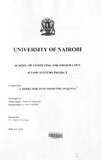| dc.description.abstract | Given the emerging technologies and the need for employers to be more flexible about where and
how people work, telecommuting would seem one logical and promising solution. However,
telecommuting does not seem to thrive in Kenya. This study explores the feasibility of
telecommuting in Kenya, examining the factors contributing to its low prevalence and the possible
benefits that can be derived from its implementation. The study further develops a model on the
process of implementing and running a successful telecommuting program in a typical
organization.
The study used a cross-sectional survey design in which standardized information was collected
froma randomly selected sample of people through written/self-administered questionnaires and indepth
data was collected through personal interviews with carefully selected sample of people and
document reviews.
This study established that there are very few elaborate telecommuting programs being used within
organizations in Kenya. Even though some organizations, especially multinationals, have the
capacity to implement telecommuting, many only go as far as offering flexible work programs. The
study examined the factors impeding uptake of telecommuting and the plethora of ongoing
initiatives that are making telecommuting a possibility today. The study puts together a
telecommuting model that outlines the set of strategies, methods, technologies and organizational
changes necessary for successful implementation of telecommuting.
Collection of statistical data on telecommuting and evaluation of the results requires several years
in order to study the before- and after-effects of telecommuting on various aspects of a worker's
life. Due to resource constraints, the proposed telecommuting model has not been tested in a real
life situation. This is an opportunity for further research that could provide empirical results of a
real telecommuting program.
This study provides a well of knowledge on Telecommuting that will go a long way in helping
Kenya to take advantage of the enabling capacity of information and communications technologies
and applications in her drive for comprehensive development. | en |

